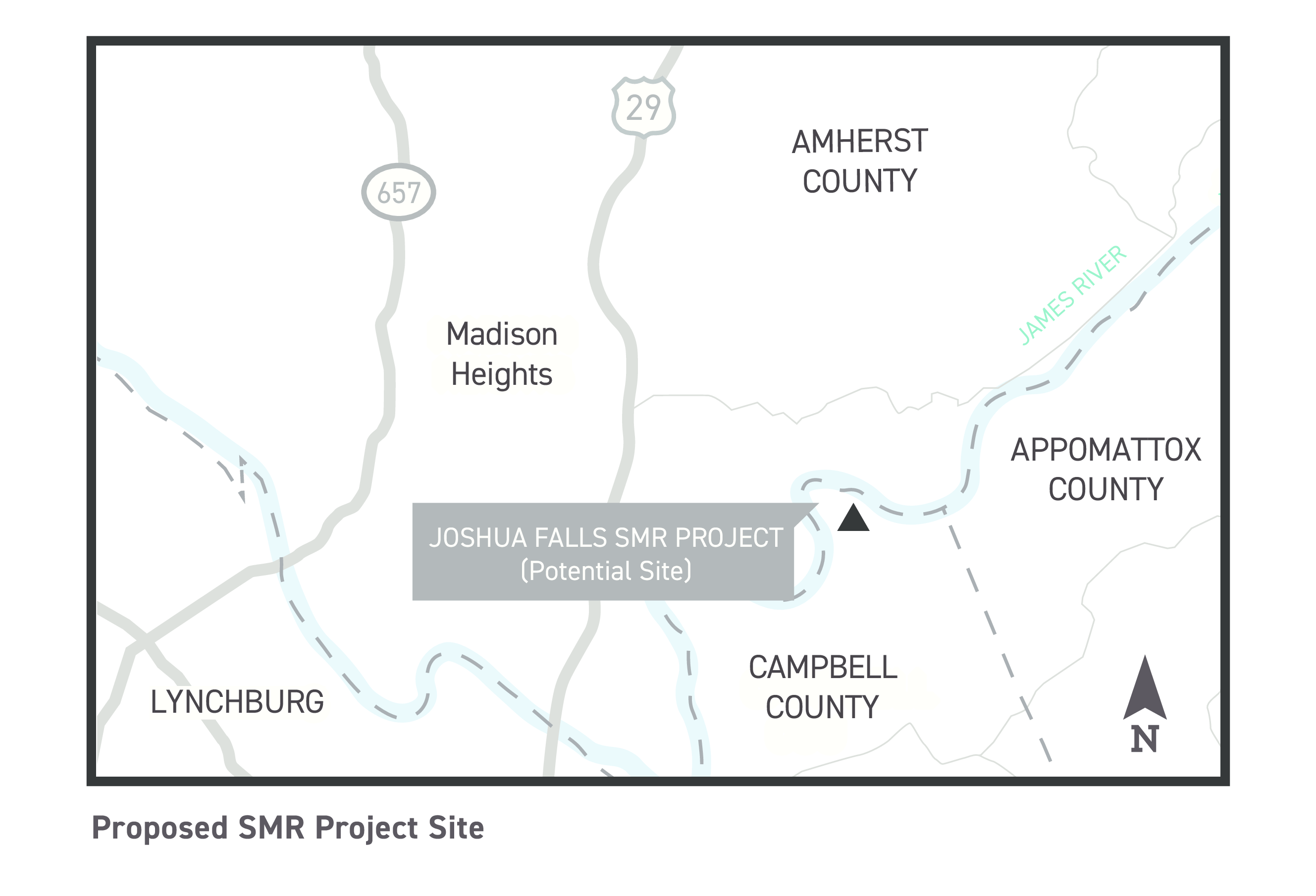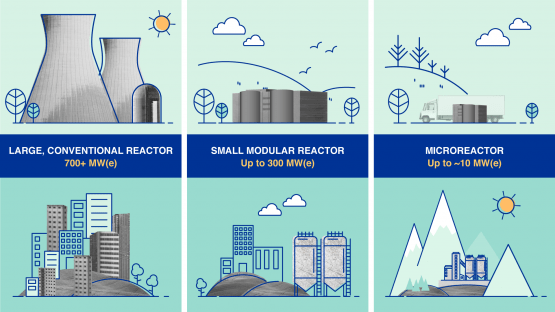See our FAQs: 25 questions about Small Modular Reactors
Appalachian Power plans to locate a small modular nuclear reactor in Campbell County, the company announced Thursday.
Appalachian said it identified its Joshua Falls property as a potential location. The site, which is along the James River a few miles outside Lynchburg, has the necessary existing infrastructure, including a 765-kilovolt electric substation and roads that can support moving equipment, the utility said. 
Small modular reactors, or SMRs, are designed to provide 24/7 power while being smaller than traditional nuclear reactors. Multiple reactors could be added at a single location to scale up power generation. The technology is relatively new, and no commercial SMRs have been deployed in the U.S.
“SMR technology is a key component to providing perfect power to our customers,” Bill Fehrman, president and CEO of Appalachian’s parent company, American Electric Power, said in a news release.
The announcement comes as Gov. Glenn Youngkin and others have pushed for more nuclear power in Virginia as part of an “all-of-the-above” energy plan to meet a rapidly increasing demand for electricity. This past summer, Dominion Energy announced that it plans to develop a small modular reactor at its North Anna power plant in Louisa County.
[Disclosure: Dominion is one of our donors, but donors have no say in news decisions; see our policy.]
Appalachian said it will begin the federal site permitting process for new nuclear reactors and will file an application related to the project with state regulators this spring.
Appalachian spokesperson George Porter said the project is expected to take at least a decade and that the utility has not chosen a company to build the SMR, which would be owned by Appalachian once complete.
“We’ll evaluate technologies and other business partners during the early site development activities,” Porter said.
Appalachian has created an informational website at AppalachianPower.com/SMR. It said it plans to work with the U.S. Nuclear Regulatory Commission, local and state agencies and other stakeholders “to educate the community about the benefits of SMRs while gathering feedback.”
Appalachian will host a community open house from 5 to 7 p.m. Dec. 5 at the Lynchburg Regional Business Alliance, 300 Lucado Place in Lynchburg. No formal presentation is planned; attendees are encouraged to come and go at any time during the two-hour period to speak with project representatives, the company said.
Campbell County Supervisor Matt Cline, who represents the county’s Concord District where the reactor would go, said in an interview Thursday that he has a number of questions, including how big the project would be and how waste material would be handled.
He said that he and residents near the Joshua Falls site have known for a while that Appalachian was planning a project there but that he just learned on Thursday that it’s meant to be an SMR.
“The assumption was that a larger substation was going to go in, not a nuclear power plant,” Cline said. “We are, as a community, very concerned.”
Defining ‘small’ in ‘small modular reactor’
Definitions vary on just how small a small modular reactor is intended to be.
The U.S. Nuclear Regulatory Commission and the International Atomic Energy Agency define an SMR as having up to 300 megawatts of generation capacity.
Appalachian says SMRs generate between 50 and 500 megawatts of energy.
The U.S. Department of Energy says SMRs can “vary in size from tens of megawatts up to hundreds of megawatts.”
Regardless, it’s agreed that SMRs are smaller than traditional nuclear reactors, which average around 1,000 megawatts, according to the DOE.
Dominion Energy’s North Anna power plant at Lake Anna in Louisa County has two nuclear reactors that together are capable of nearly 2,000 megawatts at peak capacity. Dominion says that can power 500,000 homes.
The smaller size of an SMR means that it could be built elsewhere and shipped to a site and that it could be installed at locations that would be too small for a larger reactor.
Multiple SMRs could be installed in a single location to meet a specific power generation requirement.
Having multiple reactors generating electricity also could allow some of them to be taken offline for maintenance while others in the same place continue producing energy.
While the technology has its backers, SMR plans have yet to come to fruition in the U.S.
In November 2023, NuScale Corp., which has the only SMR design certified by the U.S. Nuclear Regulatory Commission, announced it was canceling its plan to build six 77-megawatt modules in Idaho, citing inflation and increased construction costs.
Appalachian customers might pay some SMR development costs
Laws passed during the last General Assembly session allow Appalachian and Dominion to seek approval to charge customers for the costs of developing SMRs.
Del. Israel O’Quinn, R-Bristol, sponsored the legislation to allow Appalachian to apply to the State Corporation Commission, which regulates electric utilities in Virginia, for permission to add a charge to customers’ bills to recover up to $25 million per year, not to exceed $125 million total, of SMR development costs.
The law expires in 2034.
“We are grateful to the Virginia General Assembly and Governor Youngkin for embracing SMR technology — this announcement would not have been possible without their forward-thinking support,” Aaron Walker, Appalachian Power president and COO, said in Thursday’s news release.
Appalachian said Thursday that it plans to seek a share of $900 million in U.S. Department of Energy grant funding for SMRs to “help reduce customer costs.”
Dominion is Virginia’s largest electric utility, while Appalachian is the second-largest. Appalachian has more than 540,000 customers in Western Virginia.
SMR would have nuclear-industry neighbors
Although the SMR, if completed, could potentially be a first for Virginia or even the U.S., other aspects of the nuclear industry are already represented in that part of Campbell County.
The Joshua Falls property is a short distance from where the firms BWX Technologies and Framatome each have operations on Mt. Athos Road off U.S. 460.
Lynchburg-based BWXT produces nuclear fuel and components for the U.S. military. It employs about 7,000 people, including about 2,800 in the Lynchburg area, most of whom work at its Mt. Athos manufacturing facility. Its Advanced Technologies division is developing nuclear reactors and fuel for spacecraft.
“BWXT proudly supports advanced nuclear energy solutions in our neighborhood, the commonwealth and across North America,“ Rex Geveden, president and CEO of BWXT, said in a statement to Cardinal News. “We applaud Appalachian Power for initiating this exploratory study, and look forward to the generation of clean reliable power to the greater Lynchburg region.”
Framatome is a French company with its North American headquarters in Lynchburg. It designs, builds and maintains commercial nuclear reactors.
At Mt. Athos, it has its Framatome Inc. Solutions Complex, a testing and service center for nuclear power plant equipment and systems. Unlike BWXT, Framatome does not manufacture or process nuclear fuel at its Campbell County site.
“Framatome congratulates AEP for their commitment to advancing clean energy in our local community in Central Virginia,” the company said in a statement.
Appalachian joins Dominion in planning for SMRs
In July, Dominion announced plans to explore building an SMR at Lake Anna. Last month, Dominion and the tech giant Amazon announced that Amazon agreed to pay for it.
SMRs are seen as one possible answer to Virginia’s rapidly rising electric demand, which is driven largely by data centers in Northern Virginia that supply the computing power for a variety of internet services from artificial intelligence to video streaming.
In October 2022, Youngkin visited the electrical transformer manufacturer Delta Star in Lynchburg and said he wanted to see an SMR in Southwest Virginia within the next decade.
This past March, he said Virginia would likely be the home of the country’s first SMR, but it wouldn’t be in Southwest Virginia.
On Thursday, Youngkin hailed Appalachian’s announcement, saying in the utility’s news release that advanced nuclear power is at the heart of the commonwealth’s “all-of-the-above” energy plan, which “prioritizes abundant, reliable, affordable, and increasingly clean power to fuel our thriving and growing economy.”
“I am grateful that Appalachian Power is taking this next step to support Virginia’s nuclear future,” Youngkin said. 



